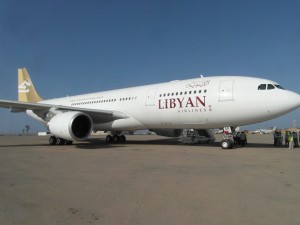By Libya Herald staff.

Tripoli, 15 December 2013:
The EU Air Safety Committee appears to be losing patience with the Libyan Civil Aviation . . .[restrict]Authority (LYCAA) which has imposed a voluntary ban on Libyan carriers flying to the EU while it reorganises its local certification processes.
Sources suggest that the continued failure of the LYCAA to meet international requirements could result in an outright ban by the EU itself. The Libya Herald has also been told that it could take at least three years for the LYCCA to set its house in order.
The key issue, said the EU committee, is for Libya to prove it has completed work to reform its civil aviation safety system and in particular ensure “that the safety oversight of all air carriers certified in Libya is in compliance with international safety standards”
It is clear from the documents just published by the EU Safety Committee that it has been pushing Libya to make progress. On 7 October, it asked for an update on the re-certification of Libyan carriers. A month later representatives from the LYCAA, as well as Libyan Airlines and Afriqiyah Airways arrived in Brussels. According to the EU committee, the Libyan team said “that in its view they had now completed the five-stage re-certification process for Libyan Airlines, and that this airline should be allowed to operate within the Union. Documentation of the activities undertaken by the LYCAA in the re-certification process was handed to the Commission at the meeting”.
This newspaper understands that the documentation that Libya provided was considered to be generally inadequate. Officially however, the EU has since noted: “The documents submitted supporting the re-certification of Libyan Airlines as presented to the Committee could not be sufficiently evaluated in time for the meeting of the Committee”.
It went on to assert that in its view, it appeared that the number of LYCAA inspectors was insufficient for the work that the body had to do.
Perhaps just as seriously, the EU said that commercial ambulance flights made by Libyan operators had not been sufficiently restricted within EU airspace. This, it said, was in contravention of the voluntary ban that the LYCAA had agreed to impose. The problem was compounded by the fact that some of these ambulance flights to the EU had been subject to “ramp inspections” on arrival “and on a number of occasions significant deficiencies were found”.
The EU warned that from now on, before the LYCAA considers authorising Libyan carriers to fly to the EU, it should demonstrate to the EU Safety Committee’s satisfaction, “that the recertification process has been effectively completed and that there is sustainable continued oversight in accordance with ICAO [International Civil Aviation Organisation] standards.
“Should this not be demonstrated to the satisfaction of the Commission and the Air Safety Committee, the Commission would be obliged to take immediate measures to prevent air carriers from operating within the Union”. In other words, the EU would impose a ban.
In July, the Director General of the LYCAA, Captain Nasereddin Shaebelain, told the Libya Herald that the main challenge had been the re-certification of Libyan pilots. This has been taking longer than expected. At the time, Shaebelain said he hoped the process would be completed by the end of the year but added that the LYCAA was keen to take its time and ensure that all the correct standards were met. [/restrict]








